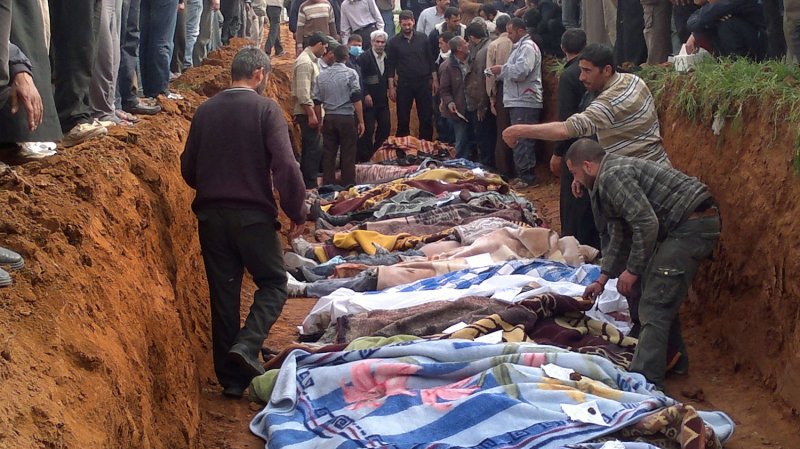People bury the bodies of men activists say were killed by the Syrian government army, in Taftanaz village, east of Idlib, Syria April 5, 2012. UPI |
License Photo
DAMASCUS, Syria, June 12 (UPI) -- U.S. Secretary of State Hillary Clinton Tuesday said Russia's shipment of attack helicopters to Syria "will escalate the conflict dramatically."
"We have confronted the Russians about stopping their continued arms shipments to Syria," she said at the Brookings Institution in Washington. "We are concerned about the latest information we have that there are attack helicopters on the way from Russia to Syria, which will escalate the conflict quite dramatically."
Clinton said the United States remains a supporter of special U.N. envoy Kofi Annan's efforts to get the regime of President Bashar Assad to end the violence and to put together a group of nations, including Russia, to develop a "road map" to resolve the crisis.
Clinton said there are many elements in Syria and the surrounding region that are "terrified" about what would happen in Syria should Assad depart.
"Russia has increasingly said it was not defending Assad but is worried about what comes after Assad," Clinton said, "but there are always a lot of caveats they then interpose.
"The red line for us was the inclusion of Iran. We thought that would be a grave error since we know Iran is not only supporting the Assad regime but actively mentoring, leading, encouraging, not merely the regular army but the militias that are springing up and engaging in sectarian conflict."
Clinton said time is running out for Annan, since the U.N. Security Council is to meet in mid-July to decide whether to extend his mission.
"If there is no discernible movement by then, it will be very difficult to extend the mission," she said.
Clinton said the ever-increasing amount of weapons in Syria raise the likelihood of civil war.
White House deputy press secretary Josh Earnest told reporters Tuesday the Obama administration had no specific reaction to the United Nations' peacekeeping chief saying Syria's conflict is now a civil war.
The administration has said the Assad regime "is becoming increasingly isolated even within their own country," in large part because of the international pressure being applied," he said.
"Coordinated actions are continuing to squeeze the Assad regime financially," Earnest said. "The U.S. and international sanctions have had a significant effect in taking a bite out of Assad's reserves so, meanwhile, the regime is unable to make any money and Assad is spending all of Syria's money to kill the Syrian people. So it is apparent that the isolation is only increasing and the pressure on the regime is getting tighter."
The Jerusalem Post reported Russian President Vladimir Putin would visit Israel, his first official stop there since 2005. A date for the visit had yet to be determined, the Foreign Ministry said Tuesday.
The United Nations said its observers were blocked from entering the Syrian town of al-Haffeh by angry crowds Tuesday and were fired at as they left.
"The crowd, who appeared to be residents of the area, hurled stones and metal rods at the U.N. vehicles. The U.N. observers turned back," a spokeswoman for the U.N. Supervision Mission in Syria, Sausan Ghosheh, said in a statement.
"As they were leaving the area, three vehicles heading towards Idlib were fired upon -- the source of fire is still unclear."
No injuries were reported.
U.N. staff have been trying to reach al-Haffeh, where heavy fighting has been reported since June 7.
The United Nations reported heavy fighting between Syrian forces and opposition fighters across Syria and expressed fear Tuesday another massacre was possible.
An activist group said a mortar round struck anti-government protesters as they were leaving a demonstration in Deir Ezzor, killing 10 people following a car bomb attack late Monday that killed a dozen people, The New York Times reported.
The Syrian Network for Human Rights said Tuesday government forces in different areas of Deir Ezzor killed at least 31 people and injured more than 70 others "up to the moment of writing this report."
U.N. cease-fire monitors reported the Khaldiyeh section of Homs was being hit by artillery shelling and machine-gun fire, as well as the towns of Rastan and Talbiseh.
Annan pleaded for both sides to "take all steps to ensure that civilians are not harmed."
Ghosheh said the observers have not been able to confirm reports of casualties in the latest outbursts of violence and urged both sides "to grant the U.N. observers immediate and unfettered access to conflict zones."
Mirroring U.N. concern about the possibility of a large number of citizens being trapped, the U.S. State Department in Washington cited accounts by the U.N. monitors and anti-government Syrian activists that suggested another massacre could be looming. Last week, 55 Sunni villagers killed in Qubeir near Hama and at least 108 -- about half of them children -- were killed May 25 in the Houla northwest of Homs.
Syrian armed forces and feared plainclothes Alawite Shabiha militiamen are widely suspected in those massacres. After the Qubeir massacre, Syrian military and pro-government civilians temporarily blocked U.N. monitors from visiting the site to collect evidence.
In Washington, U.S. State Department spokeswoman Victoria Nuland said Monday fears have been raised the Syrian government "may be organizing another massacre" in the town of Haffa in Latakia province where U.N. observers have been denied access.
"We are calling this out now in the hope that we can stop what could be a potential massacre," Nuland said.
Assad's government has denied responsibility and has blamed foreign-backed terrorists.















